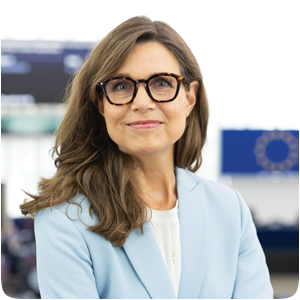 Water is vital for life and without it the world as we know it would not exist. However, as a finite natural resource, water is increasingly facing major challenges. Notably, water demand is projected to increase by 55% globally between 2000 and 2050 by the OECD to satisfy the needs of an ever increasing urban population.
Water is vital for life and without it the world as we know it would not exist. However, as a finite natural resource, water is increasingly facing major challenges. Notably, water demand is projected to increase by 55% globally between 2000 and 2050 by the OECD to satisfy the needs of an ever increasing urban population.
Meanwhile, climate change in Europe is expected to cause more droughts in the South and more floods in the North. The Green transition thus requires clever water management. It becomes of outmost importance to manage and use water intelligently. In this context, the EU must become water-smart – that is to recognise the true value of water – as soon as possible.
Industries have a crucial role to play in this equation: the industrial water sector in Europe accounts for 50 percent of water withdrawal in the continent. The most critical industrial sectors are also the ones that consume the most water (energy, semiconductors, raw materials, pharmaceutical, etc.). Therefore, water resources in industries need to be utilised more efficiently. This actually represents one of the most untapped potential of the green transition. By doing more with less, the industry can become a key catalyst in mitigating the water challenges efficiently and sustainably.
Being resource-efficient will not only reduce our impact on the environment, on biodiversity, and our climate, but will also help to minimise the risks of water shortage. Moreover, this approach can strengthen our competitiveness while positioning the European continent as a role model globally.
The money needed to invest in these changes should always be put into perspective: the cost of taking actions for business is estimated to five times lower than the cost of water risks. It remains, however, easier said than done, and we must not neglect the need to develop sustainable roadmaps for each of the relevant industrial eco-system.
One of the most critical aspect regarding water efficiency is that ready-made solutions already exist. European companies are global leaders in water technologies and Denmark, especially, is home to some of the world’s most waterefficient firms whose products (such as pumps, valves, and temperature control) can help reduce water consumption in industries.
In fact, the Danish water sector has set an aspiring goal for itself: to become energy and climate neutral by 2030. All of this is making the European continent well-placed to develop and showcase the innovations needed for our future water-smart society.
With many of the solutions at hand, the time is now ripe to scale up these solutions. Extending the application of these technologies and exporting them to other countries would bring many added benefits. For instance, a report from 2022 concluded that the "global spread of Danish waste water technology and solutions can provide energy savings equivalent to the current European electricity production with coal".
Secondly, and more broadly, the topic of water needs to be included higher in the EU political agenda. Given its importance, our considerations for water should be on a par with energy. Unfortunately, the value of water remains too often under the radar and this situation can no longer continue.
As the chair of the European Parliament's Water Group, a grouping of parliamentarians passionate about the topic of water that regularly meets and organise events in the Parliament, I am proud to participate with my colleagues in raising the profile of water in the EU agenda.
We do so by providing a space where we, policy-makers, meet with relevant industry stakeholders to discuss the concerns and priorities of the sector. This type of exchanges is particular important if we want to shape an adequate and informed legislation that is well in tune with the latest development of the sector.
Last month, we had the opportunity for instance to engage with several Danish multinational companies (Grundfos, AVK, Rambøll, NIRAS, Carlsberg Group) and understand how the industry could mitigate and overcome the challenges of water in a sustainable and efficient way.
Another way to put water on top of the EU agenda is to include strong references to water efficiency in two (on-going) important environment legislations: the Urban Waste Water Treatment Directive, which aims to make sure wastewater is treated equally across EU Member States; and the Industrial Emissions Directive, which aims to better regulate pollutant emissions from industry.
Both legislations need to work towards the development of a holistic approach that leads us to have a true water smart society without harming our economy. We must succeed in becoming both water smart and make our economy grow at the same time.
Engraving the concept water-energy nexus in EU policy is also paramount. Energy and water systems are interdependent and an integrated approach is needed to address the present and future challenges and opportunities.
A final point I would like to highlight is the importance of using digital technologies and data-centric solutions to better manage water. The Green and Digital transition work hand in hand, not apart. Using data in this context is key to improve resource efficiency, while also reducing CO2 emissions, accidents and leakages.
So let's talk more about water, when we discuss climate and energy